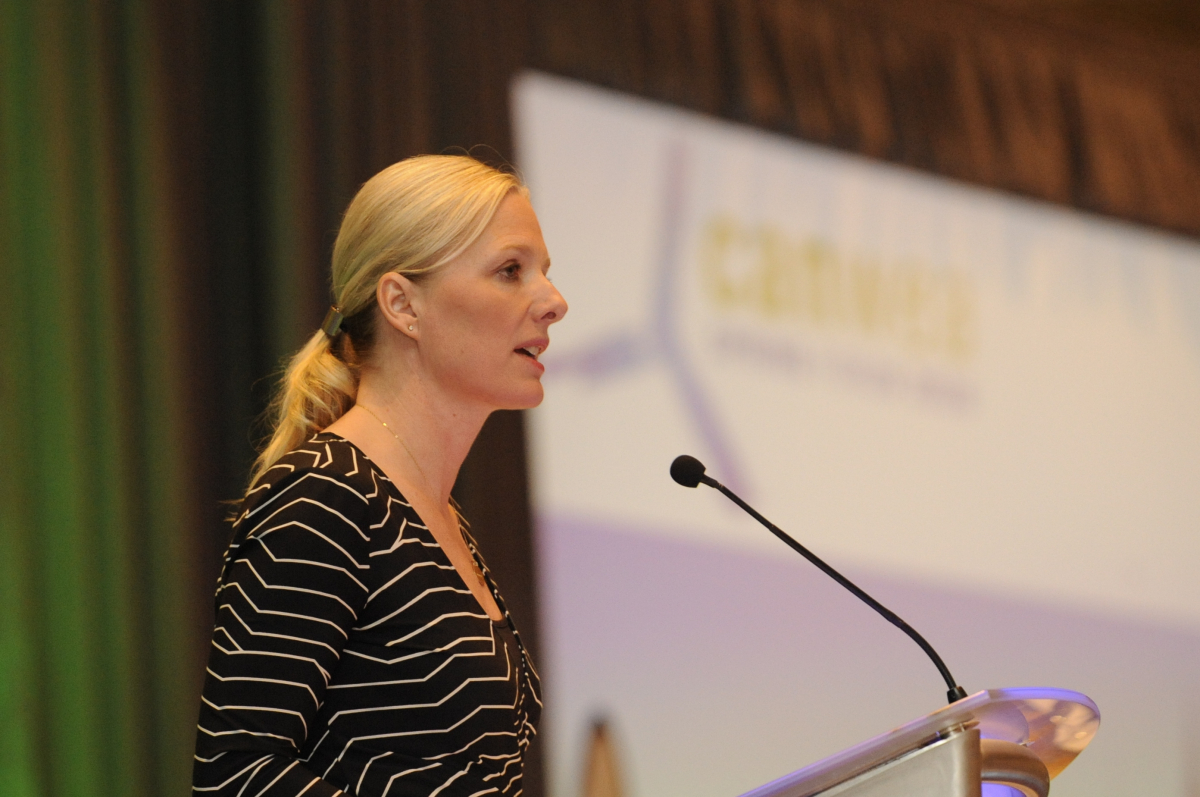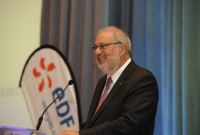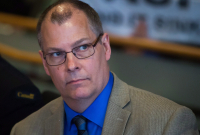Support strong Canadian climate journalism for 2025
In five and a half years, BluEarth Renewables has gone from a small start-up company in Calgary to a profitable energy producer that says it wants to embrace the future.
“I hope we can symbolize and show that renewables are cost competitive and that it’s a great growth vehicle for Canada,” said the company’s president and chief executive officer Grant Arnold in an interview with National Observer. “But certainly in Alberta, it’s a bit more topical now where we can show that we can diversify the energy mix and we can do it in a cost effective basis.”
Arnold, an engineer and former Suncor manager, was one of about 200 renewable industry professionals and business leaders attending a two-day spring forum, hosted this week in Gatineau, Quebec, by the Canadian Wind Energy Association.
New opportunities
All of their companies say they are seeing costs for renewable wind and solar energy generating projects go down and new business opportunities arising. This also comes at a time when federal and provincial governments have committed to shifting away from fossil fuels into an economy that slashes the heat-trapping carbon pollution that contributes to global warming.
But for several years, stakeholders in the wind industry felt they were being ignored by the federal government and unable to get any meetings with the environment minister to talk about jobs, growth and fighting climate change.
This changed on Wednesday as Environment Minister Catherine McKenna agreed to meet the lobby group, delivering her own invitation for them to help Canada achieve its international commitments to fight climate change.
“The possibilities here in Canada are tremendous,” McKenna told the forum in a lunch-time speech. “Solar power’s becoming truly affordable. Electric car sales are growing. Just look at the line ups for the new Tesla. Wind power is taking an increasingly larger role in our electricity supply. I like to think the sky is the limit. Canada and Canadians and I are counting on you to help us reduce our greenhouse gas emissions and meet our climate change commitments.”
McKenna's appeal to the industry came less than a week after she told a conference hosted by the Broadbent Institute that some Canadians still needed more convincing about the urgency of acting on climate change.

Industry association representatives said they welcomed McKenna's openness and her offer to cooperate with industry to achieve climate and economic progress.
The renewable power industry includes some of Alberta’s energy giants — Enbridge, Suncor and TransCanada — traditionally associated with oil and gas. They are among the largest renewable energy suppliers, collectively investing billions of dollars in renewable energy projects in Canada and around the world.
Cory Basil, vice-president of development from EDF EN Canada, a division of the French renewable energy company, said he has seen business opportunities slow down in recent years, limited to some niche projects. He said the industry still has a lot of work ahead to choose the right proposals and then work with local communities to make them successful.
“Any project that you want to build in a community needs to have adequate social licence - whether it’s wind, solar or gas - that whole concept of social licence is important,” he said.

Some critics have questioned whether renewable energy actually drives up costs for consumers and weakens the stability of existing electrical grids.
But the two-day forum also heard new evidence that challenged common public perceptions that wind power is unreliable because it depends on the weather. Tom Levy, a senior wind energy engineer from the federal Natural Resources Department, said that new research, conducted while he worked for the association, found that electric power systems only need a fraction of backup power — in the range of three per cent for every additional 1000 megawatts of wind power added to the system — to sustain the delivery of power to households.
Levy said the study demonstrated that electric power transmission systems are already designed to accommodate varying levels of supply and demand. Power is delivered through transmission lines from multiple sources, even after the wind turbines stop turning, he said.
“When they go down, there’s already something in the system that is waiting for this change in power,” Levy said.
In other words, for every 1,000 megawatts of power, the operators would only need about 30 megawatts of additional reserves as a backup to ensure the flow of power from its source to the consumer, he said.
“The fact of the matter is that the ebb and flow of power has existed since we invented power,” said Levy. “Trees fall on lines. People turn toasters on and off and substations overheat and trip off.”

Robert Hornung, president of the wind industry association, said Levy’s presentation would help “undercut the myth” about wind energy and demonstrate, instead, that it’s reliable and can be integrated into modern electric transmission systems.
The shift to cleaner energy is expected to have profound impacts on Alberta-based TransAlta Corporation, which is facing some uncertainty because its business has been largely based on coal power plants which are being phased out by the provincial government.
TransAlta has a number of renewable energy projects in development or in operation across Canada, including Ontario, Quebec, New Brunswick and Alberta. It has also made investments in a solar project in Massachusetts south of the border.
“We’ll be looking to expand that into the future. We definitely see that as part of the future toward clean energy,” said Rochelle Pancoast, managing director of gas and renewables at TransAlta.
The Alberta government has set a goal of phasing out pollution from coal power plants and producing 30 per cent of its electricity from renewable energy by 2030. This would be a significant challenge, based on the current energy mix.
The government estimated in 2014 that 55 per cent of its electricity supply was generated from coal, one of the world’s largest sources of air pollution and heat-trapping greenhouse gases. Only nine per cent of the province's power, in 2014, came from wind, biomass or hydro.
But the industry is waiting to see details of the government’s plan and whether it will include incentives.
“The government has an ambitious target on the renewable side so that obviously is a growth opportunity,” said Pancoast. “We are mostly looking for clarity so that we can have that investment confidence to really be able to grow… There’s more people (employees) on the coal side of our business. But this year, the gas-renewable side of the business is forecast to be more than half of our (earnings).”

Arnold, from BluEarth Renewables, said his company is excited about potential opportunities, following the recent government announcements, including from Ontario, which announced a new competition that will begin in August for a wave of renewable power contracts.
BluEarth, which has about 50 employees, started up with investments from the Ontario Teachers Pension Plan fund and ARC Financial Corp. in Alberta and it didn’t make a profit until 2015, Arnold said. This all changed in the past year as a significant number of its various Canadian projects came online.
“At one point, we had two operating assets and five under construction,” said Arnold. “But the idea is to build more hydro, wind and solar and then own them and operate them for their life. So it’s a long-term (business) model. And there will be ups and downs as we go, but it’s a profitable business.”








Comments